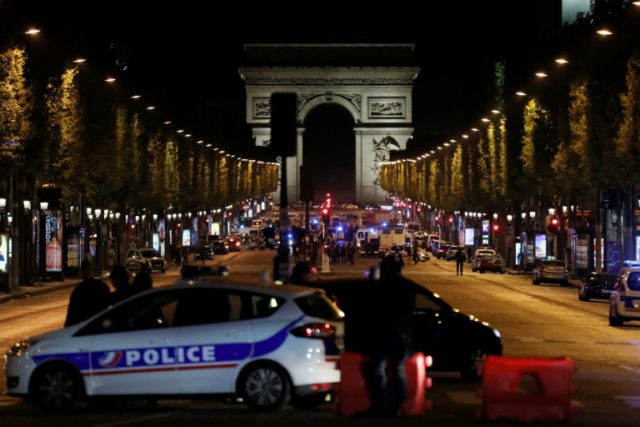Paris (AFP) – A gunman shot and killed a policeman and wounded two others on the world-famous Champs Elysees avenue in Paris on Thursday night, an attack claimed by the Islamic State group.
Here is what we currently know about the shooting, which occurred three days before the first round of the French election.
– The attack –
At approximately 9:00 pm (1900 GMT), 39-year-old Frenchman Karim Cheurfi pulled out an automatic weapon and opened fire on a police van just a few hundred metres from the iconic Arc de Triomphe.
After killing one officer Cheurfi fled on foot, with other officers in pursuit. He was killed and two officers were wounded during the ensuing gun battle. A foreign tourist was also slightly injured.
The Champs Elysees, busy with tourists and locals on a pleasant spring evening, became a scene of panic. Diners in some restaurants took refuge in basements, cinema-goers cowered in the theatres and pandemonium broke out in a nearby metro station, according to witnesses.
Police immediately sealed off the area with dozens of emergency vehicles and helicopters buzzed overhead.
– Was it terrorism? –
Anti-terror prosecutors immediately took up the investigation and President Francois Hollande said the attack was of “a terrorist nature”.
Cheurfi was being investigated by anti-terrorism authorities but was not on a watchlist of known radicals, police sources said.
In 2005, he was sentenced to 15 years imprisonment for trying to kill a police officer and another man. While in custody over that attack he grabbed the gun of an officer and shot and injured him.
He was arrested in February this year on suspicion of plotting to attack the police again but was released because of a lack of evidence.
The Islamic State jihadist group claimed the perpetrator as one of its “fighters” and a note praising IS was found near his body. Authorities also found a Koran in the car he abandoned at the scene of the attack.
In what may have been a case of mistaken identity, IS named him as “Abu Yussef the Belgian”. This raised concerns that a possible second attacker could be on the loose.
On Friday, France said it was hunting for a new suspect based on a Belgian alert received a day earlier, but it later emerged that the man had handed himself in to a police station in the Belgian city of Antwerp.
During a search of his home, Belgian police found weapons, balaclavas and a train ticket for France departing Thursday morning.
– What impact on the election? –
France, which has suffered from a wave of bloodshed over the past two years killing more than 230 people, has long feared an attack on the presidential election, the first round of which takes place on Sunday.
Authorities foiled an attack in the southern city of Marseille just a day before a campaign appearance by far-right leader Marine Le Pen.
Polls suggest that voters have been influenced more by France’s sluggish economy and sky-high unemployment than terror fears but analysts have always stressed that this could change in the event of bloodshed.
Le Pen is seen as the “hardest” on the terror threat and in recent days has switched her campaign rhetoric back to core issues of immigration and the fight against terrorism.
Some analysts have speculated that the attack could benefit conservative Francois Fillon, a former prime minister seen as an experienced hand at a time of crisis — despite an expenses scandal that rocked his campaign.
The inexperienced front-running centrist Emmanuel Macron and late-surger from the far left Jean-Luc Melenchon are not seen as particular experts on security and foreign policy.
Macron is currently leading the polls but any of these four candidates could feature in the second-round run-off on May 7, surveys suggest.
burs-cb/jm/js

COMMENTS
Please let us know if you're having issues with commenting.